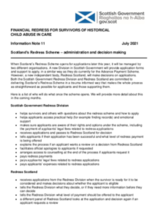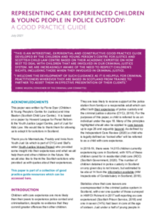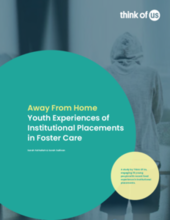Demographic Data:
|
Sources: World Bank, UNICEF, UNDP HDR 2015, DHS 2013/2014 |
Displaying 2381 - 2390 of 14348
The Kenya-Italy “Virtual Exchange Program on Foster Care” aims to create a platform for learning, networking and sharing knowledge and best practices on Foster Care among different government stakeholders, from Kenya and Italy.
The exchange program took place on 5th, 7th and 9th July 2021.
The Miracle Foundation Youth for Social Impact Program is an initiative that seeks to empower youth with lived experience of family separation to work with their local communities to address pressing challenges in the areas of transitioning from institution to family care and family/community strengthening. Miracle Foundation is inviting young people with experience of family separation to join this program.
Changing the Way We Care (CTWWC) conducted a study on the support by U.S. Catholic organizations for overseas residential care of children in 2018. This report provides insights from the study on U.S. Catholic Church support for children’s residential care facilities outside of the U.S. Its data provides a foundation for building effective engagement and messaging strategies, as well as helps inform advocacy and influence work concerning support for family strengthening and care for vulnerable children by the U.S. Catholic community.
Update on administration and decision making work taking place since the The Redress for Survivors (Historical Child Abuse in Care) (Scotland) Bill was passed by Parliament in March 2021.
The Children and Young People’s Centre for Justice (CYCJ), in collaboration with the Scottish Child Law Centre, has produced a resource to support Scottish solicitors and practitioners with Good Practice Principles when representing care experienced children in police custody, to ensure their rights are upheld.
In June 2020 CELCIS produced the first Lifelong Links Briefing, outlining the ongoing evaluation of Lifelong Links in Scotland. In it, we presented some of the initial topics that were emerging from the data we had received or collected. The aim was to help local sites and Family Rights Group to continue to develop their practice and improve the lives of children and young people in Scotland.
This study provides a deep, nuanced understanding of the lived experience and mental models of young people who have recently lived in institutional placements while in foster care. It offers an understanding of institutional placements from youths’ perspectives.
This report was prepared by CELCIS in collaboration with local authorities and stakeholders in Scotland to inform the Scottish Government Children and Families Collective Leadership Group's consideration of the impact of COVID-19 on children and families.
In this video from the Guardian, Leyland Cecco explains how the discovery of more than 1,000 unmarked graves on the grounds of former church-run residential schools in Canada is just the tip of the iceberg in uncovering Canada's traumatic colonial past.
This webinar, the fourth in a series from the Transforming Children's Care Global Collaborative Platform, explored the importance of protecting the child’s right to identity in how it is created, how it may be modified and/or falsified in alternative care as well as the need to preserve information about the child’s identity, notably family relations.







